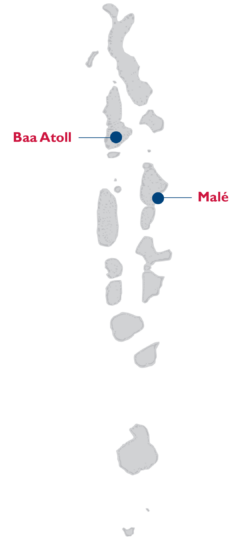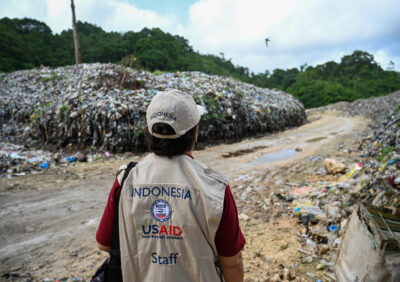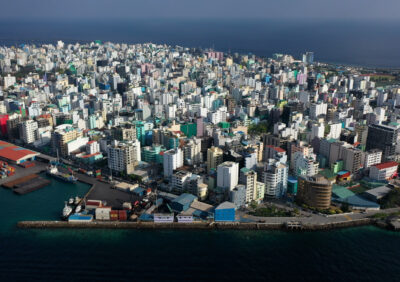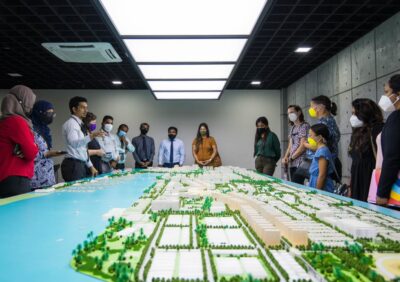USAID’s Clean Cities, Blue Ocean’s program drew to a close in the Maldives in January 2024. USAID is continuing to address plastic pollution in the Maldives through USAID/Sri Lanka and the Maldives’ Ocean Plastics Reduction Activity (2022-2027).
As an island nation, the Maldives faces a unique set of challenges in managing a rapidly growing volume of waste across its more than 1,200 islands. The country’s dispersed geography, limited land for waste storage, its densely populated capital city, and a host of other unique challenges require the Maldives to develop a solid waste management system and circular economy that can help the country more sustainably manage its waste, as well as the marine debris generated from other countries that is carried in by currents.
The Maldives’ total land area (115 sq mi) makes it the smallest country in Asia, although it is one of the most geographically dispersed countries in the world. This dispersion has proven to be extremely challenging for solid waste management; models deployed range from central and regional waste management dump sites to hybrid systems for resorts, to informal practices for local communities.
From 2019-2024, USAID’s Clean Cities, Blue Ocean program piloted new, coordinated systems to address the Maldives’ waste management challenges and reduce the flow of plastics into our oceans.
Engagement Sites

- Baa Atoll is a UNESCO-designated Biosphere Reserve, revered for its marine biodiversity. Here, USAID worked with local partners to strengthen the island’s waste management system by increasing recycling rates through a new system for regular plastic collection and compacting stations; improving waste collection services and opportunities for women to earn additional income by engaging with Women’s Development Committees; and promoting reuse and reduction of waste amongst local households, guesthouses, and cafes. Grantee, Soneva Namoona, also worked with the local Atoll Council to audit current waste management systems, address system gaps, and pilot an island waste management model that can be replicated across Baa Atoll and other island communities.
- Greater Malé residents generate more than twice the amount of waste of those on the nation’s other natively inhabited islands. USAID worked with local partners in Hulhumalé, an island in North Malé Atoll, to develop an Integrated Solid Waste Management Plan and build capacity for its implementation, including funding, social and behavior change, and gender equality components. Program grantee the Small Island Geographic Society worked with local businesses, residents, and policy makers to pilot and advance single-use plastics alternatives in support of the Maldives’ target to phase out single-use plastics in 2023.
Impacts and Results
In the Maldives, Clean Cities, Blue Ocean:
- Safely managed over 180 metric tons of waste through program technical assistance and grantee activities, with nearly half recovered or diverted from disposal.
- Of this, over 25 metric tons of plastic and other low-value waste—the equivalent of nearly 2.8 million plastic bottles—were prevented from leaking into the environment.
- Trained nearly 700 individuals (63% women) from local government, informal waste sector, and local organizations to build local capacity for solid waste management planning and programs.
- Improved solid waste services for more than 413,000 individuals, including through new programs like regular plastic waste collection and strengthened capacity of waste management organizations.
- Supported 6 new solid waste management policies to update island waste management plans and support the phase-out of single-use plastics.
Program Grantees
- In 2021 and 2022, Small Island Geographic Society (SIGS) conducted social and behavior change research in the Greater Malé area to learn about residents’ behaviors with respect to single-use plastics, what they understand about solid waste management and plastic waste, and their awareness of the Maldives’ single-use plastics phase-out policy. The research led to recommendations for local government incentive programs and future social and behavior change strategies—and was featured in a six-part docu-series that profiled 12 Maldivian families’ journey to reduce single-use plastics.
- From 2021 to 2024, Soneva Namoona worked with island communities in the Maldives to strengthen waste management. To do so, Soneva worked with the local Atoll Council to audit current waste management systems and address system gaps—ultimately creating and piloting an island model for waste management that can be replicated across Baa Atoll and other island communities. Elements of the model included: improving collection logistics for plastics, so that it is more consistent and reliable; training women’s development committees in household collection and promotion of 3Rs, so that new jobs and opportunities for income are available to women, while expanding local waste services; scaling home composting and solutions for organic waste management; and establishing new resources in the community for reuse/recycling.




